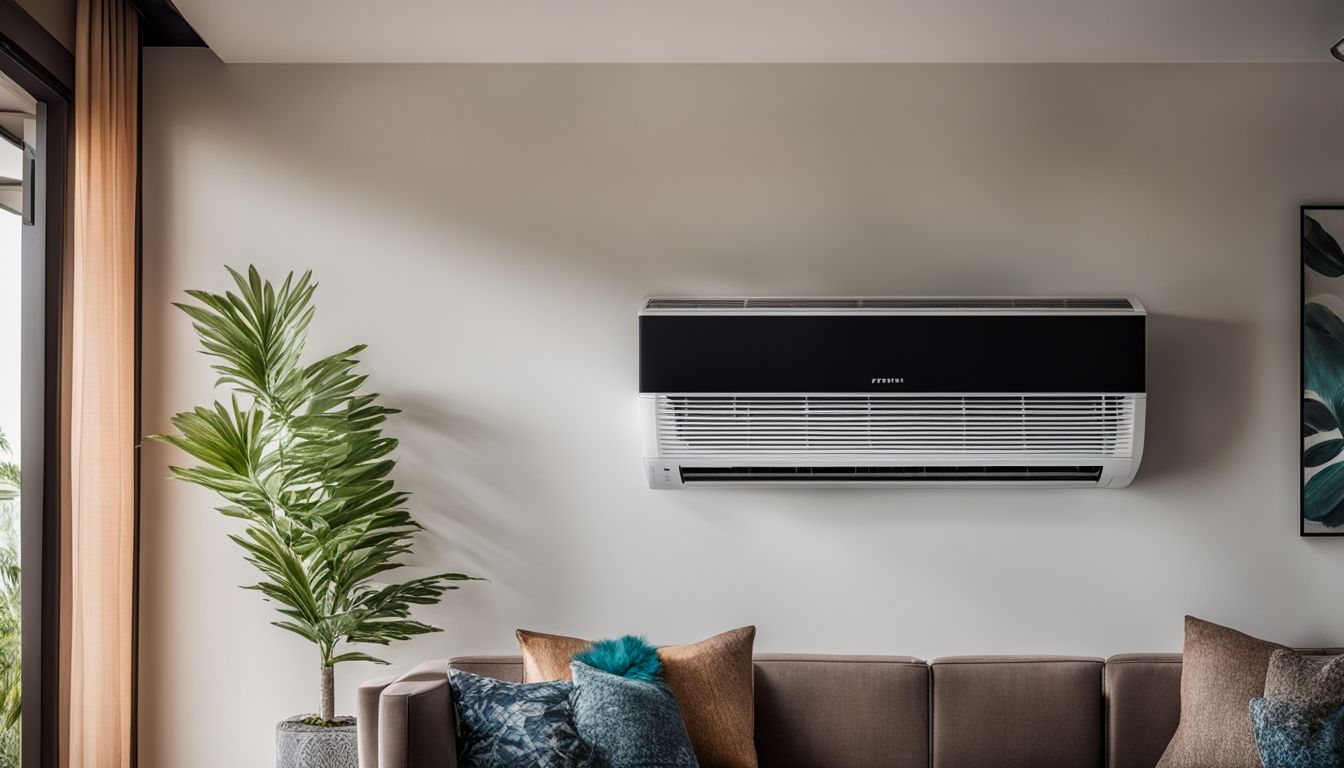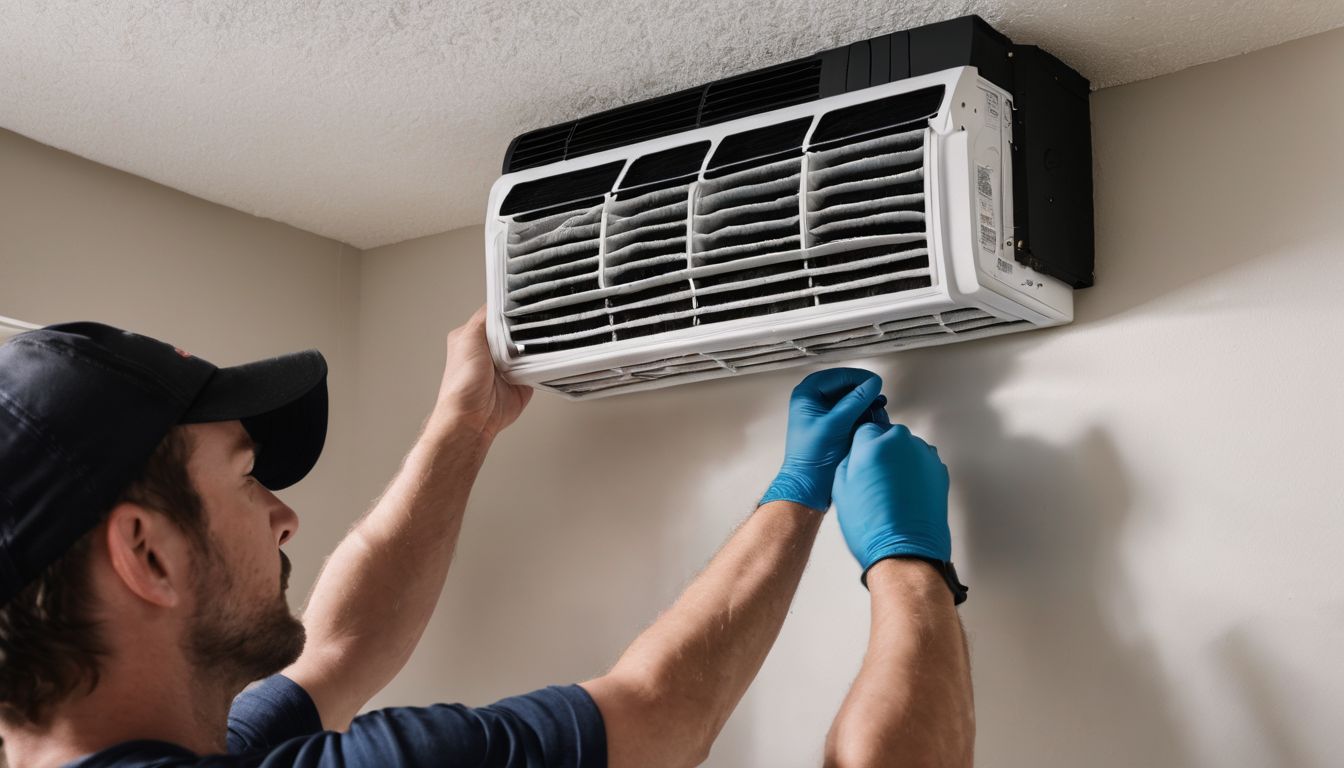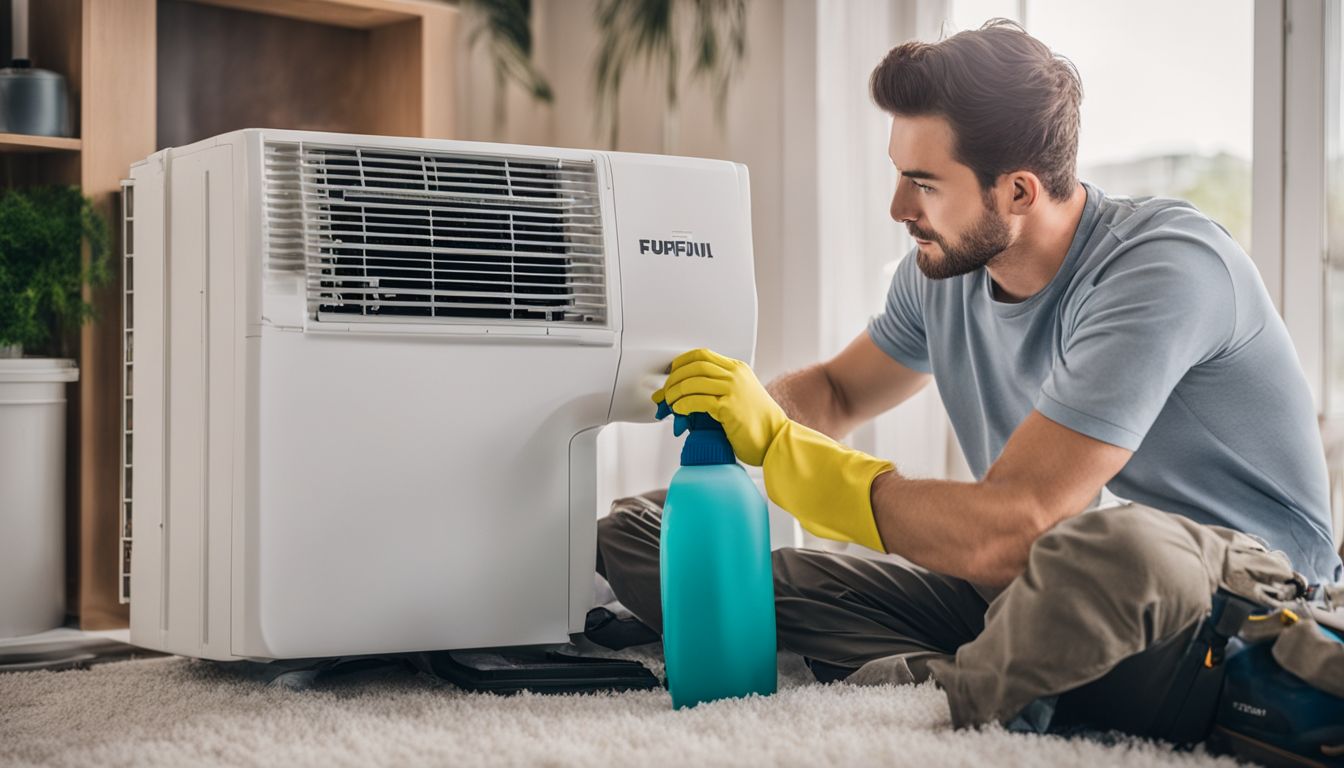Are you noticing your home isn’t as cool as it should be despite a running aircon? One vital fact is that clogged or dirty filters can severely hinder your air conditioner’s efficiency.
This article offers easy-to-follow tips to boost the performance of your aircon filter, ensuring a cooler and more comfortable environment. Dive in for cooler days ahead!
Understanding the Importance of Aircon Filter Efficiency
Aircon filter efficiency dramatically affects your home’s air quality and the energy consumption of your cooling systems. A well-maintained filter traps dust, pollen, and other pollutants, ensuring only clean air circulates through your rooms.
This benefits individuals with allergies or respiratory issues and protects the entire HVAC system from dust build-up that can lead to costly repairs.
Energy costs take a hit when filters are clogged, forcing air conditioners to work harder to maintain temperature control. Efficient filters maximise airflow and reduce strain on the unit, translating into lower energy bills and extending the lifespan of your heating and cooling appliances.
Upgrading to a high-efficiency air filter with an optimal MERV rating is smart for any homeowner seeking improved climate control and reduced energy inefficiency in their living spaces.
Practical Tips to Improve Air Conditioner Filter Efficiency
To ensure your air conditioning system operates at peak performance, embrace certain practical habits that can significantly boost the effectiveness of your aircon filter. These strategies not only enhance energy efficiency but also prolong the life span of your HVAC unit.
Regularly Change Your Air Filters
Regularly changing your air filters is vital for maintaining high indoor air quality. This simple practice can lead to better temperature control and reduced energy bills.
- Check the air filter monthly, especially during heavy use periods like summer and winter. If the filter looks dirty, it’s time to replace it.
- Aim for a replacement every three months at a minimum. Consider more frequent changes if you have pets, allergies, or live in a dusty area.
- Select air filters with a higher MERV (Minimum Efficiency Reporting Value) rating for superior air filtration. This traps more dust and allergens from circulating in your home.
- Understand that a clogged air filter can strain your HVAC system, potentially leading to costly repairs. A clean filter prevents this by ensuring smooth airflow.
- Recognise that energy savings are an added benefit of maintaining clean air filters. Efficient systems consume less power and help reduce energy consumption.
- Installing new filters is straightforward; ensure they fit snugly without gaps that could let unfiltered air pass through the system.
- Dispose of used air filters properly since they hold particles collected from your indoor environment.
- Note that reusable filters exist but require regular cleaning according to manufacturer instructions to ensure efficiency is not compromised.
Invest in a Programmable Thermostat
Switching to a programmable thermostat marks a smart move towards A/C efficiency. These innovative devices adjust your home’s temperature based on pre-set times, aligning with your schedule for optimal comfort and energy savings.
With programmed adjustments, the air conditioning system doesn’t have to work as hard when you’re not home, reducing energy consumption significantly.
Imagine arriving in a perfectly cool environment without having the A/C run all day; that’s what programmable thermostats offer. Moreover, they can be set to match peak and off-peak hours, helping you save money while taking advantage of lower rates during non-peak times.
Investing in this technology can lead to substantial cost savings over time and contribute to extending the life of your HVAC system due to decreased workload.
Seal Leaky Ductwork
Sealing leaky ductwork is a powerful step toward boosting the performance of your air conditioning system. Cracks and gaps in the ducts lead to energy losses, making your air conditioner work harder and increasing utility bills.
Use mastic sealant or metal tape to effectively close these openings and stop precious cooled or warmed air from escaping into unconditioned spaces.
Call on an HVAC technician for a thorough inspection if you suspect significant leakage. They can perform a detailed energy audit, using specialised tools to detect the smallest leaks.
Once patched up, your system will maintain consistent temperatures more efficiently and distribute airflow evenly throughout your home, leading directly to increased comfort and cost savings on energy bills.
Schedule Routine Air Conditioner Maintenance
Booking regular maintenance appointments for your air conditioner is crucial. These check-ups can prevent future problems and ensure your system runs efficiently.
- Arrange for a professional HVAC specialist to inspect your unit. They are trained to identify issues that might not be obvious but could lead to bigger problems if left unattended.
- Request a comprehensive cleaning of the air filters during the visit. This step will help maintain the cleanliness of filters, allowing better airflow and improved hygiene in your home.
- Ensure technicians clean both the evaporator and condenser coils. Clean coils function more efficiently, saving energy costs and prolonging the life of your unit.
- Ask the service expert to examine the air ducts for debris or obstructions. Clear ducts help maintain consistent temperatures and improve energy efficiency throughout your house.
- Verify that all moving parts in the air handler are well-lubricated. This reduces friction, reduces wear, and helps with quieter operation.
- Ensure they check for proper refrigerant levels, as improper levels can make your system work harder, increasing energy consumption.
- Have technicians tighten all electrical connections to safeguard against potential hazards and ensure your system operates safely.
- Instruct them to clear the drain line to prevent moisture build-up that could affect humidity levels or cause water damage.
- It’s also helpful if they calibrate your smart thermostat if you have one. Proper calibration ensures accurate temperature settings for greater comfort and efficiency.
Steps for Elevating Aircon Filter Efficiency
Improving filter efficiency is a strategic move in pursuit of optimal aircon performance. The following actionable steps are designed to ensure your unit isn’t just running but running at peak capacity, delivering clean air and cost savings.
Keep Vents Clean and Unblocked
- Schedule occasional inspections of all vents around the home. Look for any dust build-up or objects that might block air passage.
- Use a vacuum cleaner with a nozzle attachment to gently suck away any dirt from the vent grills. This prevents dust from circulating back into the room and clogging the filter.
- Ensure furniture or curtains do not cover vents, as this restricts air flowing freely throughout the space.
- Check outdoor vents to ensure they’re clear of leaves, twigs, or other natural debris. These can often gather around external units affecting performance.
- Consider installing window coverings like blinds or curtains to help regulate indoor temperatures and reduce stress on the AC unit.
- In rooms with ceiling fans, use them with your air conditioner to spread cooled air more effectively without putting extra load on your system.
- For homes with pets, increase the frequency of cleaning due to fur and dander that can easily block vents and filters.
Clean the Outdoor Unit
Cleaning the outdoor unit of your air conditioner is crucial for its efficiency. It ensures that air flows smoothly and energy is not wasted. Here’s how to properly clean your outdoor unit:
- Start by switching off the power supply to ensure safety during the cleaning process.
- Remove leaves, twigs, or debris around the condenser to prevent blockages and maintain a clear airflow path.
- Use a soft brush to gently wipe down the fan blades and exterior surfaces, removing accumulated dirt or dust.
- Check the fins on the condenser coil for bends or damage; straighten them carefully with a fin comb if necessary.
- Spray the condenser coil with water using a gentle hose setting, avoiding high pressure, which could damage the fins.
- Apply a light chlorine bleach solution to kill mould and mildew that may have formed within the unit.
- Allow everything to dry thoroughly before restoring power to ensure all components are moisture-free.
Clear the Drain Line
- Locate your AC’s drain line; typically, this is a small PVC pipe near the outdoor unit.
- Inspect the drain for any signs of blockage or algae building – which can cause clogs.
- Use a stiff wire brush to gently scrub inside the pipe, removing debris and sludge buildup.
- Flush the line with water and bleach to kill any remaining algae or bacteria.
- Check that water flows freely from the pipe, indicating it’s clear of obstructions.
- Repeat this cleaning process every few months to ensure consistent airflow and proper draining.
- Consider installing a HEPA filter in your system to minimise future dust and debris accumulation in the drain line.
Fix Air Leaks
Air leaks in your home can undermine the efficiency of your aircon filter. Sealing these leaks will ensure your air conditioner doesn’t work harder than needed.
- Identify potential leak sources around windows and doors. Use weatherstripping or caulk to seal gaps where air may escape or enter.
- Check the attic and basement for any signs of draughts. Insulation might be necessary to block these air passages.
- Inspect ductwork throughout the home for holes or cracks. Apply duct sealing tape or mastic sealant to mend these issues effectively.
- Ensure that all vents are properly sealed at connections. Loose vents can allow air to escape, reducing efficiency.
- Install foam gaskets behind outlet covers on exterior walls, as these can be hidden sources of air leakage.
- Examine the areas where pipes and wires enter the house. Seal any openings with expanding foam insulation or similar materials.
- Regularly check seals on exterior doors and replace them if worn out. Good seals keep conditioned air inside, boosting your appliance’s performance.
Increase Thermostat Temperature
Adjusting your thermostat can play a significant role in improving aircon filter efficiency. A higher temperature setting during summer reduces the strain on your air conditioner, leading to better performance.
The Positive Impact on Air Quality from a Carefully Maintained Aircon Filter

Maintaining your aircon filter can significantly improve the air that you breathe indoors. A clean filter acts like a barrier, trapping dust, pollen, and other pollutants before they spread through your home.
This is crucial for those with allergies or respiratory issues as it reduces environmental irritants. Regularly vacuuming the vents and hand-washing reusable filters ensure this protective shield functions at its best.
Efficient air circulation also hinges on a dust-free filter. It allows the entire air conditioning system to distribute cool, fresh air more effectively throughout your space without straining itself.
Fewer airborne contaminants mean cleaner breathing and less odour and humidity around areas like your refrigerator where mould might thrive. With diligent care of your AC unit’s filter, you create a healthier living atmosphere and may even extend the life span of your appliance by preventing clogs and damage caused by built-up debris.
The Role of Regular Maintenance in Aircon Efficiency
Regular maintenance plays a critical role in keeping your air conditioner running efficiently. Dirty filters, clogged ducts, and dusty coils work against the system, forcing it to consume more energy while trying to cool your space.
Professionals clean these components thoroughly when you schedule routine servicing for your aircon unit. They ensure that every part operates as intended, preventing unnecessary strain on the system.
Servicing your air conditioning system also involves checking for leaks or damage that could compromise efficiency. Technicians can identify and fix issues before they become major problems, saving you from future costly repairs.
Clean filters allow for better airflow and improved performance, translating into lower electricity bills over time. Keeping up with regular checks guarantees that the machine runs smoothly and remains reliable during those times when you need it most.
Conclusion
Maintain your aircon’s peak performance with these practical tips. Seize control of your indoor climate by keeping filters clean and systems well-serviced. Empower yourself against rising energy costs with efficient filter management.
Enjoy the benefits of cleaner air and a cooler home environment today. Make every effort count for a sustainable and comfortable living space.
Discover how a well-maintained aircon filter can significantly enhance indoor air quality by visiting our detailed guide on the impact of clean filters on air quality.
FAQs
1. How often should I change my aircon filter?
You should replace your aircon filter every one to three months for optimal performance.
2. Can cleaning an aircon filter make it more efficient?
Regularly cleaning your aircon filter can help maintain its efficiency and improve airflow.
3. Will a dirty filter cause my air con to work harder?
A dirty filter will make your air conditioner work harder by restricting airflow.
4. Is there a specific type of filter that is more efficient than others?
High-efficiency particulate absorbing (HEPA) filters are generally considered more efficient at trapping airborne particles.
5. Does a clean aircon filter affect energy consumption?
A clean aircon filter can reduce energy consumption by allowing the system to operate more smoothly and efficiently.





